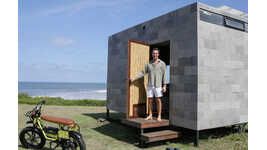'This is Temporary' is a project from artist Shay Castel that introduces a speaker, a clock and a light made from paper pulp, offering an exploration of common household objects that are often purchased as permanent fixtures for the home.
This project was created for Castel's thesis at the Holon Institute of Technology, introducing materials that are encased in biodegradable containers. As products that are designed to look temporary, the items are meant to bring on less guilt when they reach the end of their useful life to a consumer.
Inspired by the film 'Plastic China,' This is Temporary creates a strong dialogue about consumer waste and consumerism. As Castel describes: "At first glance, you know they're not going to last for long."
Biodegradable Household Objects
'This Is Temporary' Examines Permanent vs Disposable Items
Trend Themes
1. Biodegradable Household Objects - The trend towards biodegradable household objects provides an opportunity for companies to market sustainable and eco-friendly products to consumers.
2. Temporary and Disposable Design - Designing temporary and disposable products offers an opportunity to reduce waste and promote sustainability while still meeting consumer needs.
3. Conscious Consumerism - The trend towards conscious consumerism presents opportunities for companies to leverage sustainability as a key selling point and build brand loyalty among environmentally-conscious consumers.
Industry Implications
1. Consumer Goods - Companies within the consumer goods industry can leverage the trend towards biodegradable household objects to appeal to environmentally-conscious consumers and gain a competitive edge.
2. Packaging - The trend towards biodegradable materials provides opportunities for companies within the packaging industry to develop innovative solutions that address the growing problem of waste and pollution.
3. Industrial Design - Industrial designers have an opportunity to create sustainable and eco-friendly products and packaging that reflect the trend towards conscious consumerism and address the growing problem of waste and pollution.




